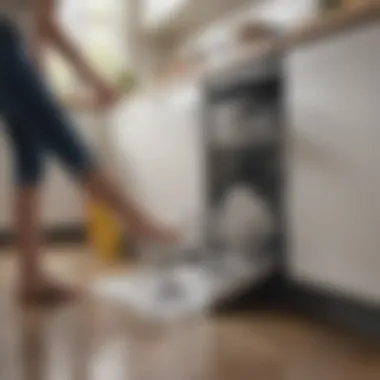Cleaning Your Dishwasher: Effective Solutions and Techniques


Intro
Dishwashers are essential appliances in many households, yet they often receive insufficient attention when it comes to cleaning. A hygienic dishwasher ensures not only the cleanliness of your dishes but also the longevity of the appliance itself. Over time, food particles, grease, and mineral deposits can accumulate, leading to unpleasant odors and diminished performance. This article will guide you through effective cleaning techniques and solutions, including safe products and methods to restore your dishwasher to its optimal state.
Feature Spotlight
Safe Cleaning Agents
Not all cleaning agents are created equal. When choosing products for dishwasher care, consider the impact on both appliance function and the environment. Vinegar and baking soda are excellent natural agents that can tackle residue and odors without harsh chemicals. For more persistent grime, commercial products like the Finish Dishwasher Cleaner can provide powerful cleansing capabilities.
Efficient Cleaning Processes
Cleaning a dishwasher involves several steps that can enhance its efficiency. Start by removing any debris from the drain. Next, check the filter and rinse it underwater to remove trapped residues. Running a cycle with vinegar can help clear stubborn buildup inside the appliance. It’s essential to regularly maintain your dishwasher to prevent excessive buildup in the first place.
"A clean dishwasher leads to cleaner dishes. Regular maintenance can save money by prolonging the appliance’s life."
Common Misconceptions
Many people believe that rinsing dishes before placing them in the dishwasher is unnecessary; however, this can lead to clogs and grime buildup inside the machine. It is also a misconception that the dishwasher doesn’t need cleaning itself. Like any appliance, it requires regular upkeep to function efficiently.
Maintenance Tips
Regular maintenance is crucial in extending the lifespan of your dishwasher. Here are some tips to consider:
- Run a cleaning cycle with vinegar and baking soda at least once a month.
- Inspect and clean the filter every few weeks to prevent clogs.
- Wipe down the seals around the door to prevent mold and mildew.
By incorporating these practices into your routine, you will ensure a more efficient and hygienic dishwasher that performs at its best.
Prelude to Dishwasher Maintenance
Maintaining a dishwasher is an essential task to ensure long-lasting performance of this home appliance. A well-maintained dishwasher not only cleans dishes but also operates efficiently, minimizes utility costs, and extends its life. The significance rests upon the realization that regular upkeep can prevent potential issues that could arise from neglect.
Regular cleaning enhances the efficiency of the machine. When food particles and grease build up, they can affect the wash cycle. This often leads to less effective cleaning, indicating the need for more cycles or even separate handwashing. Additionally, routine maintenance mandates the necessity of checking and cleaning the filter, which filters out debris and prevents clogging.
Another critical aspect is the prevention of unpleasant odors. Swirling around in your kitchen, stale smells can trigger discomfort and diminish the overall experience. This situation is particularly common in dishwashers that are rarely used or not cleaned properly, highlighting why it is vital to undertake scheduled cleanings and checks. By regularly cleaning your dishwasher, you ensure the appliance continues to perform as intended, making kitchen chores straightforward.
Maintaining a dishwasher goes beyond surface cleaning. Understanding common problems that arise from neglect, and addressing them promptly, is equally crucial. Ignoring maintenance can also result in costly repairs in the long run. Therefore, this article aims to provide practical techniques and methods for maintaining dishwashers, offering a clearer understanding of effective cleaning habits for optimal performance.
The Importance of Regular Cleaning
Regular cleaning is key to a well-functioning dishwasher. Over time, small particles of food and hair can accumulate, inhibiting water flow and cleaning efficiency. This can create a breeding ground for bacteria, leading to health concerns along with unpleasant odors. The benefits of regular cleaning are many:
- Enhanced Cleaning Ability: A cleaner dishwasher performs better, providing thoroughly washed dishes.
- Prevention of Breakdowns: Regular maintenance can help identify potential problems before they escalate into more significant issues.
- Extended Lifespan: Cleaning helps in maintaining mechanical consistency and efficiency, which can prolong the appliance's life.
- Energy Efficiency: A well-maintained dishwasher uses energy more efficiently, translating to lower utility bills.
Common Issues Caused by Neglect
Neglecting dishwasher maintenance can lead to a number of common issues that directly affect cleaning performance. Here are some problems that may arise:
- Clogged Spray Arms: Food debris can block the spray holes, preventing water from reaching all surfaces of dishes.
- Bad Odors: A build-up of food and moisture can cause foul smells.
- Residue on Dishes: If filters are not cleaned, soap and food residue can remain on dishes after cycles.
- Leaking Water: Accumulation on seals and hoses due to neglect can lead to leaks, promising costly repairs.
- Increased Noise Levels: When components are not clean, the appliance can become louder during operation due to increased friction and strain.
Addressing these issues requires awareness and regular maintenance. Proactively cleaning your dishwasher can prevent these common problems, ensuring effective operation at all times.
Understanding Your Dishwasher


Understanding the dishwasher is crucial for effective cleaning and maintenance. This appliance is designed to simplify the task of dishwashing. However, knowing how it functions can prevent issues and ensure optimal performance. By grasping the basic components and mechanisms at play, users can identify potential problems early and maintain hygiene effectively.
Basic Components of a Dishwasher
A dishwasher consists of several key components that work together seamlessly. These include:
- Spray Arms: Responsible for distributing water throughout the dishwasher, ensuring every item receives adequate cleaning.
- Filters: Essential for trapping food particles and debris, preventing them from recirculating.
- Heating Element: Heats water to the necessary temperature for effective cleaning and sanitization.
- Detergent Dispenser: Releases the appropriate amount of detergent at the right time during the wash cycle.
- Pump: Circulates water during washing and drains it after the cycle is complete.
Each component plays a vital role. Understanding them enables owners to pinpoint issues when performance decreases. For example, a clogged filter may result in poor cleaning, indicating that it needs attention. Regular examination of these parts can prolong the dishwasher's life and enhance its efficiency.
How a Dishwasher Works
The operation of a dishwasher can be broken down into several steps, which illustrate its automated process:
- Loading: Users load dirty dishes, ensuring they do not block spray arms.
- Filling with Water: After starting, the machine takes in water through the inlet valve.
- Heating Water: The heating element brings the water to the desired temperature, generally between 120°F and 150°F.
- Washing Cycle: The spray arms rotate, spraying hot water mixed with detergent onto the dishes. This action loosens food particles.
- Draining: Once washing completes, the dirty water is drained away.
- Rinsing: Clean water is used again to rinse off the detergent from the dishes.
- Drying: The final phase involves drying the dishes. This often uses the residual heat from the wash cycle.
Understanding this cycle provides insight into why regular maintenance is necessary. If any stage is disrupted, the entire cleaning process can fail, leading to dishes that are not properly cleaned.
"Knowing the internal workings of your dishwasher significantly impacts its performance and longevity."
Overall, awareness of both components and processes allows for better care, addressing issues before they become major problems. Regular attention to these aspects influences how well the dishwasher cleans and functions over time.
Recommended Cleaning Agents
Choosing the right cleaning agents is crucial to maintaining the efficiency and longevity of your dishwasher. The agents you choose will directly influence your appliance's hygiene, performance, and overall lifespan. There are two main categories of cleaning agents: commercial products and natural alternatives. Each has unique benefits and potential drawbacks that should be considered to ensure effective cleanliness without damaging your dishwasher.
Commercial Dishwasher Cleaners
Commercial dishwasher cleaners are specially formulated products designed to tackle tough stains, grease, and mineral build-up. They usually come in various forms, such as gels, powders, or tablets, which you can easily find at grocery stores or online.
The primary advantage of these cleaners is their effectiveness. Most commercial products contain powerful detergents and chemicals that can remove stubborn residues and accumulated grime with minimal effort. They offer convenience, as they often come with easy-to-follow instructions. However, one must also consider some potential disadvantages.
- Cost: Commercial cleaners can be more expensive than natural alternatives.
- Chemical Composition: Some contain harsh chemicals that might not be suitable for all dishwashers.
- Environmental Concerns: Many people prefer to avoid synthetic substances in favor of more eco-friendly options.
In summary, commercial cleaners are effective but should be used with caution, particularly if you are concerned about their chemical components.
Natural Alternatives
Baking Soda
Baking soda is a well-known, versatile cleaning agent that effectively deodorizes and removes stains. Its abrasive nature helps to scrub away grime without scratching surfaces, making it suitable for various cleaning tasks within the dishwasher.
Baking soda's main characteristic is its ability to neutralize odors, which in turns contributes to a fresher-smelling dishwasher after cleaning. It is a popular choice due to its low cost and availability. An additional advantage is that it is non-toxic and environmentally friendly.
However, its unique feature is that it works best when combined with other agents, such as vinegar, for enhanced cleaning effects. While it may not be strong enough to handle severe build-up on its own, it is a beneficial choice for routine maintenance.
Vinegar
Vinegar is another excellent natural cleaning alternative, admired for its antibacterial properties. It is often used to eliminate grime, hard water stains, and odors. Vinegar's acetic acid content is key to breaking down mineral deposits, making it highly effective in cleaning appliances.
The pivotal characteristic of vinegar is that it is a readily available, inexpensive, and eco-friendly option, posing no risks related to toxic chemicals. It is safe for most dishwasher components and leaves behind a clean, fresh scent. However, overuse may harm rubber components in some dishwashers. This makes moderation a wise approach when utilizing vinegar for cleaning.
Citrus Solutions
Citrus solutions, derived from various fruits like lemons and oranges, have gained recognition for their natural cleaning abilities. The citric acid present in these solutions effectively cuts through grease and grime.
Key characteristics include their pleasant fragrance and acidity, which can effectively tackle stubborn stains. They serve as a beneficial choice for those looking to freshen up their dishwasher naturally.
Additionally, citrus solutions can leave surfaces shiny and reflect light nicely. However, they may not be as effective on heavy build-up compared to other cleaning agents. While they are a friendly and potent option, they might require repeated applications for tough stains.
Ultimately, the choice between commercial products and natural alternatives comes down to personal preference, budget, and environmental considerations. Each choice has its merits, and understanding these can empower you to maintain your dishwasher effectively.
Step-by-Step Cleaning Process
Understanding the Step-by-Step Cleaning Process is crucial for maintaining a dishwasher's effectiveness and longevity. This systematic approach ensures that each component is addressed methodically. It allows for a thorough cleaning, helping to prevent unpleasant odors, buildup of hard water stains, and food debris that can compromise performance. Following defined steps also simplifies the cleaning task, making it easier to incorporate into regular maintenance routines.


Preparing for the Clean
Before engaging in the cleaning process, it is essential to gather the necessary supplies. This preparation stage sets the groundwork for efficient cleaning. Start by turning off the dishwasher and removing any items inside. Next, collect the cleaning agents and tools you will need. These include:
- Mild dish soap
- White vinegar
- Baking soda
- Soft cloths or sponges
- A small brush for hard-to-reach areas
Having everything at hand streamlines the cleaning process, allowing you to focus on each task without interruptions. Make sure the workspace is well-lit and ventilated. This ensures safety and allows for better visibility of any grime or buildup.
Cleaning the Filter
The filter of the dishwasher is often overlooked, but it plays a vital role in trapping food particles and preventing them from recirculating during the wash cycle. To clean the filter, follow these steps:
- Locate the filter: Open the dishwasher door and find the filter at the bottom of the appliance.
- Detach the filter: Pull it up gently. Some models may require twisting before removal.
- Rinse thoroughly: Use warm water and gently scrub the filter with a soft brush to remove any stubborn debris.
- Reassemble: After cleaning, place the filter back in its original position.
Regular filter maintenance can significantly enhance the dishwasher's cleaning efficiency. Neglecting this step can lead to poor wash results and unpleasant odors.
Deep Cleaning Interior Components
Once the filter is clean, focus on the interior components. This includes the spray arms, walls, and door seals. For the spray arms, remove them carefully and rinse under warm water. Use a toothpick to clear any blockages from the holes. For the walls and door seals, a solution of mild dish soap and warm water is effective. Wipe down using a cloth, paying special attention to any buildup or residue.
Ensure that no soap residue remains, as it can affect future dishwasher loads. Deep cleaning these interior components aids in preventing further issues and can substantially improve the dishwasher's overall performance.
Sanitizing with Vinegar
After the physical cleaning is complete, sanitizing is essential to eliminate any lingering bacteria and odor. White vinegar serves as an excellent disinfectant. Here’s how to utilize vinegar effectively:
- Place a cup of vinegar: Position a cup filled with white vinegar on the top rack of your empty dishwasher.
- Run a hot cycle: Start a normal wash cycle on high heat.
- Rinse: The vinegar will break down any remaining food particles and sanitize the appliance.
Using vinegar not only sanitizes but also neutralizes odors, leaving your dishwasher smelling fresh. This step reinforces overall cleanliness and hygiene, finalizing the deep cleaning process effectively.
"Regular cleaning of your dishwasher components can improve performance and extend the appliance's lifespan."
Implementing these step-by-step processes ensures your dishwasher remains efficient, hygienic, and free of unpleasant odors, ultimately enhancing your kitchen experience.
Addressing Common Problems
Cleaning your dishwasher is not only about enhancing its appearance but also involves tackling issues that arise from regular use. Understanding common dishwasher problems allows you to maintain the appliance efficiently and avoid further complications. A proactive approach to these issues can also prolong the lifespan of your dishwasher, ensuring it operates at peak performance.
Odor Elimination Strategies
Dishwashers can develop persistent odors, often due to trapped food particles and stagnant water. To effectively eliminate these odors, you should start by cleaning the filter regularly.
- Remove and Clean the Filter: A clogged filter can trap debris that contributes to unpleasant scents. Remove the filter, rinse it under warm water, and use a brush to dislodge stubborn particles.
- Run a Vinegar Cycle: Place a cup of vinegar on the top rack and run a hot cycle. Vinegar acts as a natural deodorizer, neutralizing bad smells and sanitizing the interior.
- Use Baking Soda: After running the vinegar cycle, sprinkle a cup of baking soda on the bottom of the dishwasher and run a short hot cycle. This additional step can provide a fresh scent and further cleanse the interior surfaces.
Dealing with Hard Water Build-Up
Hard water can leave unsightly mineral deposits on your dishwasher's components. If left unaddressed, these deposits can reduce the efficiency of your machine and dull the appearance of your dishes.
- Identify the Problem: You may notice cloudy glassware or limescale build-up as indicators of hard water issues.
- Vinegar Treatment: Like odor elimination, running a cycle with vinegar can help dissolve mineral deposits. Place a bowl of vinegar on the top rack and run a hot cycle.
- Install a Water Softener: If hard water is a constant issue, consider investing in a water softener. This device can significantly mitigate mineral build-up in your plumbing system, benefiting other appliances as well.
Removing Stains from the Interior
Stains can accumulate over time, due to the combination of food residues, grease, and other substances using the dishwasher. These stains can be visually unappealing and may harbor bacteria.
- Clean with Baking Soda: For general stains, sprinkle baking soda on affected areas, scrub gently with a soft cloth or sponge, and rinse with water. This simple method is effective in many cases.
- Use Commercial Cleaners: For more stubborn stains, consider a commercial dishwasher cleaner specifically made to tackle tough stains.
- Regular Inspections: Incorporate periodic cleaning of the seals and edges of the door where stains can accumulate. This attention to detail can keep your dishwasher looking and functioning better.


Effective problem-solving in dishwasher maintenance not only improves the hygiene and performance of the appliance but also encourages a cleaner kitchen environment.
Preventive Maintenance Tips
Preventive maintenance can significantly enhance the efficiency and longevity of your dishwasher. By integrating some simple practices into your routine, you can avoid larger issues down the line and save on potential repair costs. Regular maintenance also ensures that your dishwasher continues to deliver optimal cleaning results. In this section, we will discuss two key aspects of preventive maintenance: the frequency of cleaning and proper loading techniques.
Frequency of Cleaning
Establishing a regular cleaning schedule for your dishwasher is essential. A consistent cleaning routine minimizes the buildup of food particles, grease, and mineral deposits that can accumulate over time. Ideally, you should aim to clean the dishwasher every month. However, this may vary based on usage.
For example, households that use their dishwasher daily might find it beneficial to clean it every two weeks. On the other hand, those who use it less frequently may safely extend it to every six weeks. Pay attention to any signs of wear, like unpleasant odors or a decrease in cleaning efficiency, as they indicate that it's time for a cleaning session.
Proper Loading Techniques
Loading your dishwasher with precision is as crucial as cleaning it. Correct loading improves cleaning performance and helps prevent damage to dishes. Here are some guidelines:
- Top Rack: Place glasses, cups, and smaller items here. Ensure they are spaced apart to allow water flow.
- Bottom Rack: Reserve this for larger items like pots and pans. Face them down to facilitate better water spray.
- Silverware Basket: Mix up utensils to prevent them from nesting and blocking water.
Proper loading not only maximizes space but also minimizes the risk of breakage.
To summarize, preventive maintenance entails not only regular cleaning schedules but also thoughtful loading practices. By adopting these habits, you are investing in the efficiency and lifespan of your dishwasher, ensuring it remains a valuable asset in your kitchen.
When to Seek Professional Help
Understanding when to engage professional services for your dishwasher is key for maintaining its efficiency and longevity. Many homeowners might attempt to troubleshoot issues themselves, but some problems require expertise. Recognizing the limits of your knowledge is essential to avoid further damage.
When you notice significant changes in performance, such as unusual noises, failure to clean dishes effectively, or leaks, it is time to consult a professional. Early intervention can save money and time in the long run. Ignoring these signs often leads to more significant issues, often resulting in costly repairs or replacements.
Identifying Performance Issues
Identifying performance issues involves observing your dishwasher's operations closely. If you experience the following symptoms, you should consider seeking help:
- Inconsistent Cleaning: Dishes emerge dirty or have spots and stains.
- Unusual Noises: Grinding, rattling or hissing sounds that are not typical of your dishwasher's operation.
- Leakage: Water pooling around the base of the appliance.
- Failure to Start: The machine does not respond when you press the start button.
Each of these issues can stem from different causes, ranging from minor to severe, and a professional can diagnose the problem accurately.
Common Service Faults
Service faults are not unusual. Understanding common service faults can help you recognize when you need professional help. Here are a few:
- Clogged Spray Arms: Blocked spray arms can lead to poor cleaning performance.
- Defective Door Seal: A worn or faulty door seal may cause leaks, impacting efficiency.
- Electrical Issues: Problems with wiring or the control panel often require expert repair.
- Drainage Problems: Inability to drain water effectively can indicate a broken pump or improper installation.
Each concern can affect the dishwasher's lifespan and performance. Acting promptly can help maintain the functionality of your appliance. If you notice any of these faults, do not hesitate to reach out to a qualified technician.
End
Cleaning your dishwasher is more than a chore; it is essential for optimal performance and longevity of the appliance. Regular maintenance not only ensures that your dishes come out clean but also prevents unpleasant odors and inefficiencies caused by buildup. When you maintain your dishwasher, you contribute to a hygienic kitchen environment, which is vital for health.
Summarizing Key Points
To summarize, several key points emerge from this guide:
- Importance of Regular Cleaning: Regularly cleaning your dishwasher prevents issues like odors and poor washing performance.
- Understanding Your Dishwasher: Knowing the components and operation helps in identifying what needs cleaning and when.
- Effective Cleaning Agents: Both commercial cleaners and natural alternatives can effectively sanitize the appliance, removing grease and buildup.
- Step-by-Step Process: Following a systematic cleaning process can make the task easier and more thorough, ensuring no areas are neglected.
- Preventive Maintenance: Proper use and maintenance can significantly extend the life of the dishwasher.
- When to Seek Professional Help: Understanding signs of malfunction will aid in getting timely help, saving time and money in the long run.
By keeping these points in mind, you can ensure that your dishwasher operates efficiently and remains a reliable tool in your kitchen.
Final Thoughts on Dishwasher Care
"Dishwashers, when cared for properly, save time and effort while ensuring cleanliness in the kitchen."
Taking these steps makes a significant difference in the everyday life and functionality of your home. Remember, a clean dishwasher is an efficient dishwasher.







